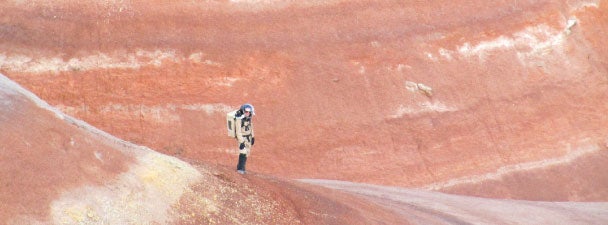David Kutai Weiss ’12 has a goal, plain and simple: He wants to go to Mars.
There are, however, just a few problems. For starters, consider that no human has ever been there. Next, realize that Mars is anywhere from 36 million to 250 million miles away, depending upon its and the Earth’s positions in orbit. Last, recognize it’s very, very cold on the red planet, and that Mars is without ready supplies of oxygen and water necessary for human survival.
Pfft. Details! It’s nothing that can’t be solved, says Weiss.
The geology major should know. He spent his winter break at the Mars Desert Research Station in Utah, living with five other volunteer researchers in a small, two-story structure meant to simulate a Mars space station. For two weeks, the crew ate dried food, slept in sleeping bags shoved into personal quarters the size of broom closets and used baking soda and dry shampoo to clean their teeth and hair. Each day they’d venture outside into the desert, but not before zipping up in space suits and closing an airlock to the research station. It was extremely important to the crew to simulate the conditions of Mars as accurately as possible, no matter how uncomfortable conditions became.
“If you want fresh air,” Weiss explains, “you can’t just go outside.”
When in the desert, Weiss and his colleagues traveled on four-wheel-drive all-terrain vehicles, which were stand-ins for the six-wheel-drive rovers NASA currently has exploring Mars. During these desert excursions, Weiss collected soil samples and studied topography. This data enabled him to create maps of the nearby desert that revealed where the soil was dense enough for safe travel, and where there existed steep changes in elevations that would be unsuitable for their motorized vehicles.
Also, Weiss’ maps detailed the best areas for extracting water from the desert soil. Many current mission proposals suggest human visits to Mars would likely last two and a half years (six months to get there, 18 months to conduct research while waiting for Mars and Earth to become close again in their orbits and eight months to return), meaning astronauts must produce their own water supply, possibly by baking chunks of Mars’ soil. To simulate this, Weiss collected soil samples from the Utah desert and placed them in an oven when he returned to the College. After baking the samples at 1,050 degrees, Weiss monitored how much water could be extracted.
On New Year’s Day, the simulation ended. Weiss and his colleagues left the Mars Desert Research Station and celebrated their experience by eating at an Applebee’s restaurant in Grand Junction, Colo., before flying home.
“For two weeks we were eating dried food,” says Weiss, “so having a real meal was nice.”
Weiss’ fascination with space exploration began at the College. Geology professor Cass Runyon recalls Weiss coming to her planetary geology class with question after question. He was so curious, in fact, that Runyon stopped answering his questions, and instead encouraged him to research the answers himself. To foster his enthusiasm for such research, she introduced him to members of the Mars research community.
Weiss never looked back. Soon he was arranging internships at NASA’s Goddard Space Flight Center in Greenbelt, Md., and Jet Propulsion Laboratory in Pasadena, Calif. He also enrolled in a NASA mission design class at the College, where he and classmates worked with engineering students in Alabama and France to design a hypothetical $800 million space mission. Scientists and aerospace engineers reviewed the students’ plan and lavished their work with praise.
“They were wondering if it was a real proposal, it was so good,” says Runyon.
When not pretending to be on other planets, Weiss makes the most of his time on this one. He builds skateboards, designing the longboards with AutoCAD and stacking layers of laser-cut rock maple with the help of a vacuum press. He practices martial arts twice a week and regularly goes backpacking. Recently he wrote a sci-fi novel inspired by a dream. After sending the manuscript to his father and a friend for editing, he got bored and started writing the sequel.
If it seems that Weiss is trying to squeeze a lot in, perhaps it is because he doesn’t plan to be here forever. Should there be a colony on Mars within his lifetime, he would volunteer to be a settler on the Red Planet. Until then, there’s still more to learn. This fall he’ll begin a five-year Ph.D. program studying planetary geosciences at Brown University, and, after that, he hopes to train to become an astronaut and join one of the first manned expeditions to Mars, planned to occur around 2030.
Weiss has a real shot at becoming an astronaut and accomplishing his lofty goals, Runyon believes: “David could actually make it. He’s got the wherewithal to do it. He can really make a dent in our nation’s space exploration program.”

In other words, the sky is not even close to the limit for Weiss.
Photos by Leandro G. Barajas





